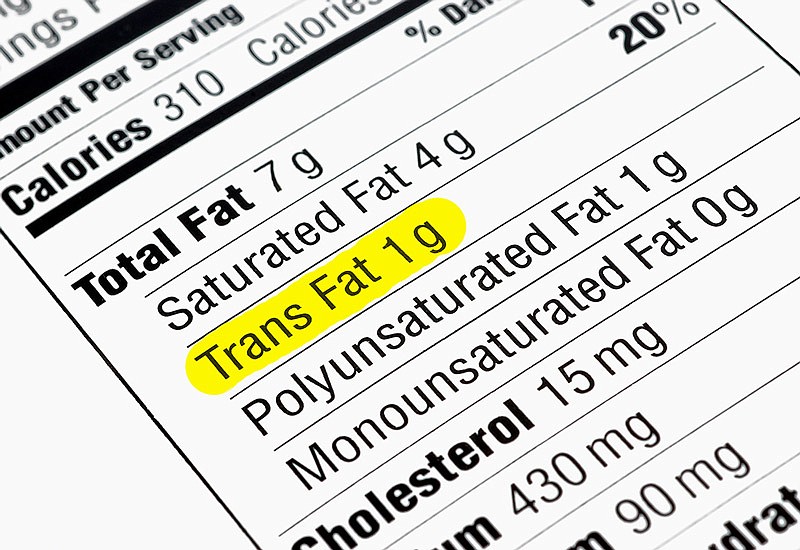There was a time when the accepted thought was to eat no fat. However, we now know that your body absolutely needs fat. Most Americans get plenty of fat in their normal diet. As far as types of fat, read on for more information.
There are four types of fat in our food: saturated fat, trans fat, polyunsaturated fat, and monounsaturated fat. The two fats that are harmful to your health are saturated and trans fats. Polyunsaturated and monounsaturated fats are good for your health. The goal is to replace saturated and trans fats with polyunsaturated and monounsaturated fats as much as possible.
Which foods have saturated fat? Saturated fat is found in high-fat animal products, like bacon, sausage, ribs, bologna, pastrami, salami, pepperoni, whole milk, 2% milk, regular cheese, regular yogurt, butter, and lard. One of the more controversial sources of saturated fat is coconut oil. Coconut oil has 13 grams of saturated fat per tablespoon (by comparison, butter has 7 grams of saturated fat per tablespoon). Because of its high saturated fat content and the vast majority of research pointing to saturated fat being harmful to our health, the American Heart Association recommends avoiding eating coconut oil. Perhaps future research will show that coconut oil is perfectly fine. Currently, there is not enough research to support this belief.
Trans fat is made when oils are partially hydrogenated. Trans fat prolongs shelf life, improves texture, and improves flavor. Unfortunately, it is especially harmful for our heart health. Harvard's Center for Nutrition did a study on trans fat in the 1990s. They found that people who ate more than 2 grams of trans fat per day had a 70% increase in their heart disease risk. The good news about trans fat is that added trans fat will be banned from our food in 2018. Food companies are already starting to take trans fats out of foods. The bad news is that you can still find trans fat in many foods, including shortening, many bakery products (because bakeries often use shortening), and many processed foods with fat added to them. Think frosting, cookies, cakes, donuts, hot cocoa mixes, granola bars, crackers, even powdered coffee creamer the list goes on. Whenever we can, we should avoid trans fat.
Where can we find the good fats? You will find poly- and monounsaturated fats in many high-fat plant foods, like avocados, nuts, nut butters, and plant oils; including canola oil, olive oil, vegetable (usually soybean) oil, peanut oil, and corn oil. Fatty fish is high in an especially-important polyunsaturated fat: omega-3s. Salmon, tuna, mackerel, herring, and trout are considered good sources of omega-3 fatty acids. The recommendation is to eat about 6 ounces of these fish per week. Other fish -- such as catfish, crappe, bass, bluegill, tilapia, etc. -- are not bad to eat; they are just lower in omega-3s compared to the fatty fish.
Remember to work on replacing the bad fats (saturated and trans fats) with good fats (poly- and monounsaturated fats). A little fat is a good thing!
For more information, visit the USDA website on the "oils" group: www.choosemyplate.gov/oils
Lynn Grant R.D., L.D., CDE is a Registered Dietitian and Certified Diabetes Educator. She works at Capital Region Medical Center and provides outpatient nutrition counseling and diabetes education by appointment. She also writes a nutrition blog, which you can view at nutritionnotions.wordpress.com.
Recipe: Homemade Trail Mix
When you're done mixing the ingredients together, scoop out cup into small plastic bags or plastic containers. That way, you have a healthy, portable snack that's pre-portioned for you!
Prep Time: 5 minutes Makes: 15, -cup servings
Ingredients:
cup unsalted peanuts
cup unsalted cashews
cup unsalted pecans
cup dried cranberries
cup raisins
Directions:
Mix together all ingredients in a large bag or bowl. Scoop out cup for 1 serving.
Nutrition Information (per cup): 70 calories, 5 g fat, 1 g saturated fat, 1 mg sodium, 87 mg potassium, 41 mg phosphorus, 7 g carbohydrate, 1 g fiber, 4 g sugar, 2 g protein.


